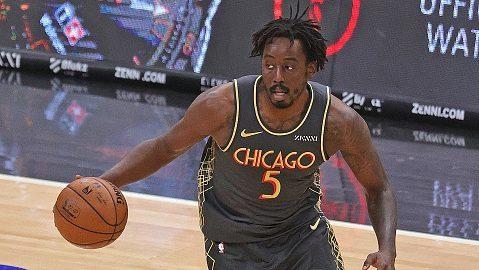
Aminu came to the Bulls in the Nikola Vučević trade, which sent Otto Porter Jr., Wendell Carter Jr., and two first-round picks to the Orlando Magic. Though Aminu mostly came in the trade as salary filler (his $10M cap hit combined with Vučević’s salary to match that of Porter and Carter), he was expected to fill a nice bench role for the Bulls. That never really happened.
Aminu didn’t play for the Magic until early February due to a torn meniscus he suffered in 2019. He ended up playing in 17 games for the Magic before being traded, averaging 5.5 points on 40% shooting, 5.4 rebounds, and 1.7 assists in 21.6 minutes per game.
After being traded to the Bulls, Aminu saw a reduction in his playing time and his production dipped. Aminu only played in 6 games for Chicago, averaging 1.5 points on 20% shooting (he made two shots on April 30 and missed every other attempt), 3.2 rebounds, and 0.3 assists in 11.2 minutes per game. Aminu was frequently inactive as a “coach’s decision” despite the myriad of injuries and COVID protocols that impacted the Bulls roster.
Though some may argue that Aminu’s reduced production last season was due to his recovery, he’s never been a very effective player. His best defensive rating in a full season was 108.8 (league average in both offensive and defensive rating was 110.6 in 2019-20), and his only above-average offensive rating (116.3) came in 2018-19 with the Trail Blazers.
Al-Farouq Aminu Season Grade: F
I expected Aminu to fit into the Bulls rotation as solid wing depth, but he failed to even play significant minutes for this Bulls team. Unlike John Mulaney, Aminu’s making too much money to just be sitting on the bench. Aminu will reportedly pick up his 10 million dollar player option, which will severely limit the Bulls’ financial flexibility as they approach an offseason in which many expect significant roster turnover as several contributors (Lauri Markkanen, Daniel Theis, Garrett Temple, etc.) hit the open market and the team searches for a long-term answer at the point guard position. Aminu’s contract would be hard to get rid of: A trade would likely mean giving up future assets, and waiving and stretching his salary would sacrifice long-term financial flexibility for the team. The more likely scenario is that Aminu returns to being a mediocre player (which would be a good thing considering this last season) and carves a role out on the team as wing depth before entering free agency next offseason.
All stats via nba.com unless otherwise specified
